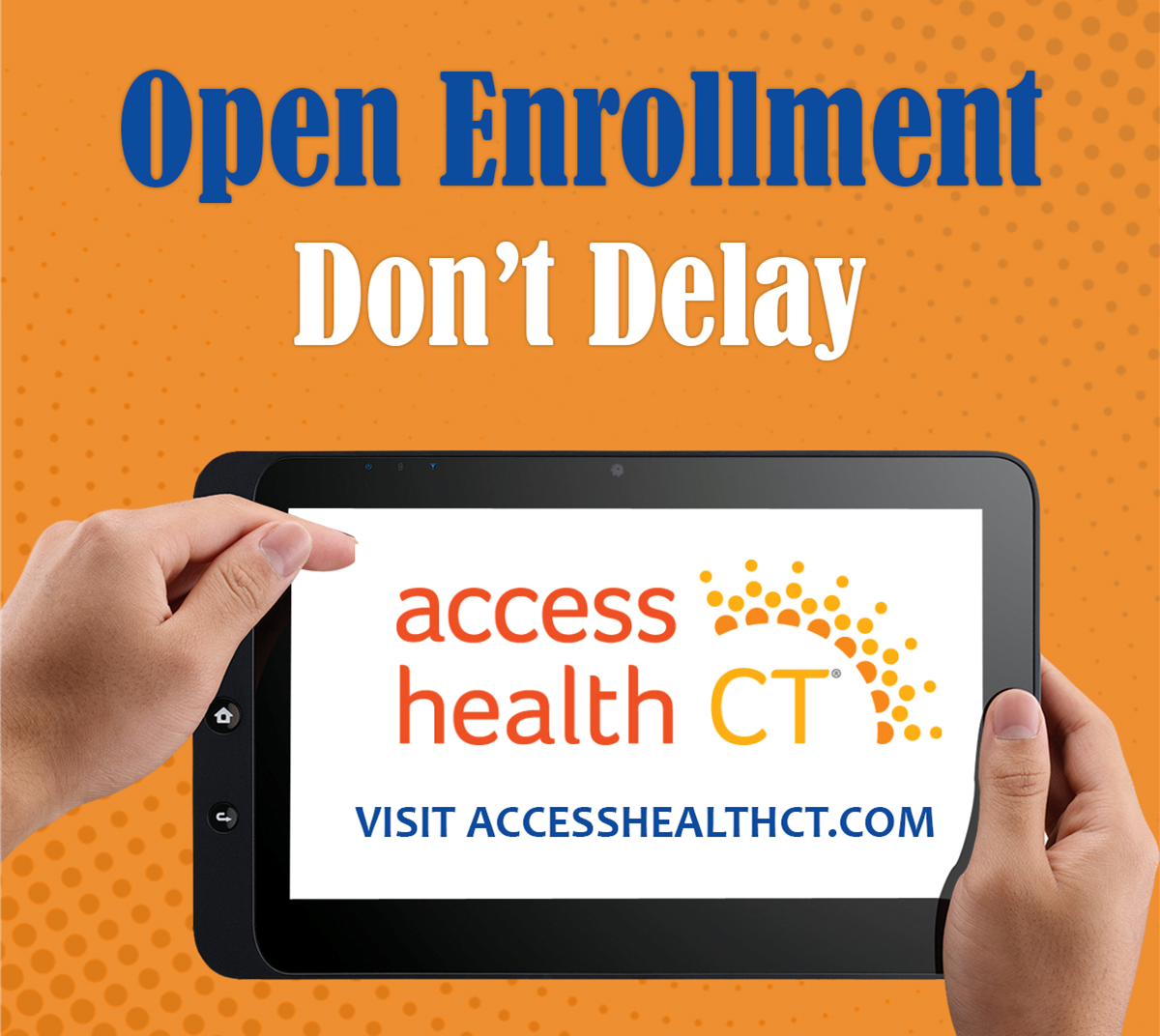PERSPECTIVE: Making Our Own Individual End-of-Life Decisions
/by Paul Bluestein I am speaking out about this because my friend Hal can’t.
Hal was an international systems analyst until his retirement after which he devoted his time to things he loved including music, theatre, painting, sailing, windsurfing, gardening, and photography. He volunteered for the CATCH Program in Bridgeport, and the Norwalk Senior Center. Over the years, he served on boards of the American Red Cross, his church, the Carver Center in Norwalk and the Voluntary Action Center.
Hal was physically active and involved in the life of his community then, at age 90, he was diagnosed with a terminal illness. He did not want to endure the inevitable period of declining mental and physical capability or the pain of being dependent on his wife and children after a lifetime of independence. Hal had lived a long, productive and rewarding life and wanted to die with dignity … just as he had lived and not spending his hours and his days between medical treatments and interventions that would only prolong, for a short period, the remaining time he had. He wanted to bring a rapid end to what had been a life well-lived.
Hal’s wife of 57 years agreed with his decision and so did his children. He talked to his doctor who, not surprisingly, was unable to do anything for his patient. Hal wrote to his friends to say goodbye and to let them know that he had decided to not eat or drink – anything – until he died. He had made the calculations and figured that would be the way he could accomplish his quickest exit. It took Hal more than a week to die, but during that time he never voiced any regret about his decision but he often said that he wished there had been an easier option for him.
It would be easy to see Hal’s story as just an anecdote, especially if you don’t happen to agree with the decision he made. But this is not just an anecdote to me. It’s personal. For me, for my wife, and for most of my friends who are about my age, one of the biggest worries that we share is that we may end up without having the right to make the our own most personal decisions at the end of our lives.
We live with the fear that, because we live here in Connecticut, a state that does not honor individuals’ rights to use prescribed medication to end their lives peacefully rather than suffering a painful and protracted death, we may end up having to leave our home to travel to a more humane state, or to do as our friend Hal, and more recently Denny, did and quit eating and drinking to hasten our own final exits.
 I sit before you now as someone past 70 wondering why you - strangers to me, members of this Public Health Committee as well as your colleagues in the CT General Assembly - get to decide what my end of life is going to be like. This is very real … and gets more real every day for me and thousands of other people in Connecticut.
I sit before you now as someone past 70 wondering why you - strangers to me, members of this Public Health Committee as well as your colleagues in the CT General Assembly - get to decide what my end of life is going to be like. This is very real … and gets more real every day for me and thousands of other people in Connecticut.
I have been a practicing physician. I’ve seen firsthand the indignities and suffering that dying can inflict. I am no stranger to the American way of dying. But, in my last days or months, what I want for myself, for my wife and friends, and also for my physician, is to have available all options for care at the end of life. I do not want others to consign me to starving myself to death to avoid prolongation of life that has lost its meaning to me.
More than 20 years ago, Oregon implemented its Death with Dignity Act. Since then, Washington, Vermont, California, Montana, Colorado and Washington DC have passed legislation authorizing medical aid in dying for terminally ill adults, and just this week, the Hawaii State House approved the Our Care, Our Choice Act.
Last November, the Vermont Medical Society dropped its opposition to Death with Dignity; in December, its Massachusetts counterpart followed suit. Physicians are increasingly becoming Death with Dignity proponents and 7 in 10 Americans support death with dignity.
What about Connecticut? Death with Dignity bills have been considered several times. The first attempts came in 1995 and 1997. After Washington passed the second Death with Dignity statute in the nation, the issue returned to the Connecticut legislature in 2009. Bills considered in 2013, 2014, 2015 and 2017 received Committee hearings but were not put up for a vote.
Isn’t it finally time for the citizens of this state, and their doctors, to have the right to make their own decisions about the care they will receive at the end of their own lives?
_________________________
Dr. Paul Bluestein, MD, FACOG is an obstetrics & gynecology specialist in Fairfield, and has been practicing for four decades. This testimony was submitted to the Connecticut General Assembly’s Public Health Committee earlier this year and is included in the record of a public hearing on proposed legislation that would have allowed “a physician to dispense or prescribe medication at the request of a mentally competent patient that has a terminal illness that such patient may self- administer to bring about his or her death.” The proposal was not approved during the 2018 legislative session.


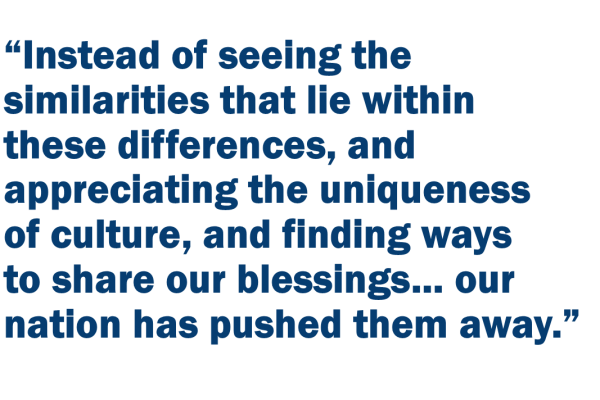 Instead of seeing the similarities that lie within these differences, and appreciating the uniqueness of culture, and finding ways to share our blessings… our nation has pushed them away. They have become a "them", divided from our population out of fear of these differences and blindness to the multitudes of commonalities. If you could talk to Reyna about her dream of being a doctor and how much she loves learning new words, if you could talk to Munir about his favorite songs and how he tells jokes to make friends… then you would see the similarities we share, and yet how many differences they face. However, do not be mistaken, this doesn't stop them.
Instead of seeing the similarities that lie within these differences, and appreciating the uniqueness of culture, and finding ways to share our blessings… our nation has pushed them away. They have become a "them", divided from our population out of fear of these differences and blindness to the multitudes of commonalities. If you could talk to Reyna about her dream of being a doctor and how much she loves learning new words, if you could talk to Munir about his favorite songs and how he tells jokes to make friends… then you would see the similarities we share, and yet how many differences they face. However, do not be mistaken, this doesn't stop them.
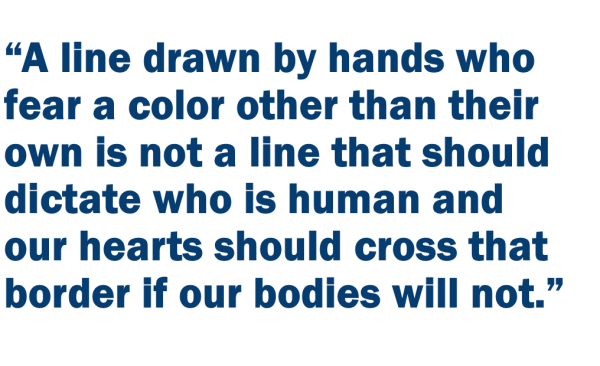 If you could see them the way I see them, as hard-working individuals that will do anything to provide for their family (like many of us would do), as welcoming neighbors who will open their doors to anyone...and as people. Not Mexicans, not drug-traffickers, not prostitutes, not foreigners, not aliens, not "them"...humans, people, children. These 11.6 million US citizens have names, stories, hopes, and families. The 303, 916 people who were apprehended at the Mexican border in 2017 have names, stories, hopes, and families. As do we.
If you could see them the way I see them, as hard-working individuals that will do anything to provide for their family (like many of us would do), as welcoming neighbors who will open their doors to anyone...and as people. Not Mexicans, not drug-traffickers, not prostitutes, not foreigners, not aliens, not "them"...humans, people, children. These 11.6 million US citizens have names, stories, hopes, and families. The 303, 916 people who were apprehended at the Mexican border in 2017 have names, stories, hopes, and families. As do we.
 In the Connecticut State Colleges and Universities (CSCU) system, unstable housing - or the lack of housing altogether – is a barrier to academic success and stability for many students. Faculty, counselors and deans report that students are living in cars and “couch surfing” at friends’ or relatives’ homes while, at the same time, they are trying to attend college because they know that education is their path to a better future. During Town Hall meetings across the state during the 2016-17 academic year, CSCU President Ojakian was approached by many students who said that they were homeless and needed additional support.
In the Connecticut State Colleges and Universities (CSCU) system, unstable housing - or the lack of housing altogether – is a barrier to academic success and stability for many students. Faculty, counselors and deans report that students are living in cars and “couch surfing” at friends’ or relatives’ homes while, at the same time, they are trying to attend college because they know that education is their path to a better future. During Town Hall meetings across the state during the 2016-17 academic year, CSCU President Ojakian was approached by many students who said that they were homeless and needed additional support.
 Of those schools reporting more than 30 individuals surveyed, the schools with the largest percentages of students experiencing a housing crisis are as follows: 38% at Gateway Community College with 42 students surveyed; 21% at Middlesex with 71 students surveyed; 26% at Eastern CT State University with 117 students surveyed; 19% at Housatonic with 320 students surveyed; 14% at Manchester Community College with 290 students surveyed; 13% at Three Rivers Community College with 164 surveys completed; 10% at Northwestern CCC with 88 completed surveys;11% at Asnuntuck with 81 surveys completed; 9% at Naugatuck Valley Community College with 243 completed surveys; 13% at Norwalk Community College with 72 surveys completed, and 38 surveys completed at Tunxis Community College with a 13% rate of housing instability and homelessness.
Of those schools reporting more than 30 individuals surveyed, the schools with the largest percentages of students experiencing a housing crisis are as follows: 38% at Gateway Community College with 42 students surveyed; 21% at Middlesex with 71 students surveyed; 26% at Eastern CT State University with 117 students surveyed; 19% at Housatonic with 320 students surveyed; 14% at Manchester Community College with 290 students surveyed; 13% at Three Rivers Community College with 164 surveys completed; 10% at Northwestern CCC with 88 completed surveys;11% at Asnuntuck with 81 surveys completed; 9% at Naugatuck Valley Community College with 243 completed surveys; 13% at Norwalk Community College with 72 surveys completed, and 38 surveys completed at Tunxis Community College with a 13% rate of housing instability and homelessness. ppression.
ppression. “These inventions of prudence cannot be less requisite in the distribution of the supreme powers of the State.”
“These inventions of prudence cannot be less requisite in the distribution of the supreme powers of the State.”
 In its 2018 Salary Guide for Accounting and Finance Professionals, Robert Half, a global staffing firm specializing in accounting and finance professionals, reports “There’s high demand for top talent in public accounting due to a severe shortage of skilled candidates…” Their “In-Demand Certifications” list puts “CPA” at the top.
In its 2018 Salary Guide for Accounting and Finance Professionals, Robert Half, a global staffing firm specializing in accounting and finance professionals, reports “There’s high demand for top talent in public accounting due to a severe shortage of skilled candidates…” Their “In-Demand Certifications” list puts “CPA” at the top.
 Why is this so important?
Why is this so important?
 If college students care more than ever about getting a job after graduation, then why are they struggling to find good jobs in a relatively strong economy? The disjunction here is apparent. Many potential factors can explain this disconnect, but one that I find prevalent on my campus is that all rising seniors seem to want to work in the same select few cities.
If college students care more than ever about getting a job after graduation, then why are they struggling to find good jobs in a relatively strong economy? The disjunction here is apparent. Many potential factors can explain this disconnect, but one that I find prevalent on my campus is that all rising seniors seem to want to work in the same select few cities.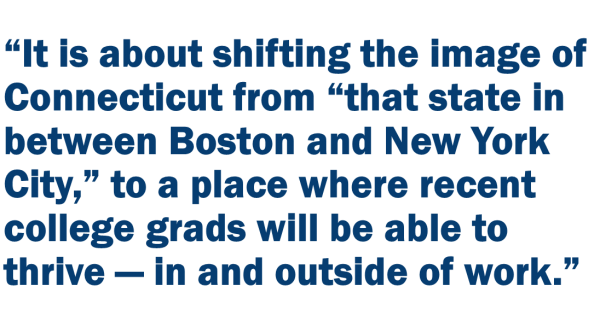
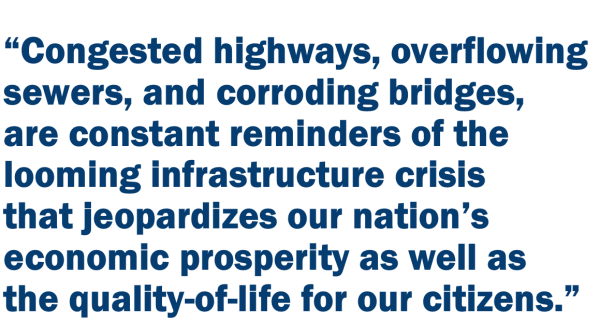 Congested highways, overflowing sewers, and corroding bridges, are constant reminders of the looming infrastructure crisis that jeopardizes our nation’s economic prosperity as well as the quality-of-life for our citizens. With new grades just published in 2017, the condition of our nation’s infrastructure has shown little to no improvement since receiving a collective grade of a C- in 1988 and with some areas even sliding toward failing grades.
Congested highways, overflowing sewers, and corroding bridges, are constant reminders of the looming infrastructure crisis that jeopardizes our nation’s economic prosperity as well as the quality-of-life for our citizens. With new grades just published in 2017, the condition of our nation’s infrastructure has shown little to no improvement since receiving a collective grade of a C- in 1988 and with some areas even sliding toward failing grades.
 e the overall economic health of each town, their business climates, and their relative affordability. Next, we came up with a score for each town—a city’s highest possible score was 5. We also considered qualitative data like access to small business resources, overall quality of life, and economic and commercial development initiatives in each town to come up with a more holistic definition of the “best.”
e the overall economic health of each town, their business climates, and their relative affordability. Next, we came up with a score for each town—a city’s highest possible score was 5. We also considered qualitative data like access to small business resources, overall quality of life, and economic and commercial development initiatives in each town to come up with a more holistic definition of the “best.”


